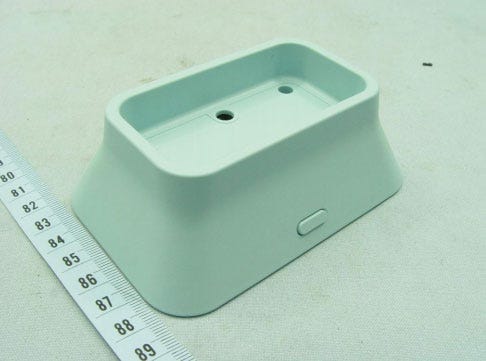March 10, 2016
Google's life sciences company Verily has submitted photos and more information in its quest to land the federal government's permission to use a "connectivity bridge" to collect patients' medical data, according to media reports.
Nancy Crotti

Google's life sciences company Verily has submitted photos and more information in its quest to land the federal government's permission to use a "connectivity bridge" to collect patients' medical data, potentially giving Qualcomm a run for the money in this market niche.
FCC received an application for the connectivity bridge in September, but this week's filing provided the first glimpse at the device, according to a report by Business Insider. The odd-looking device appears to be a wireless hub to collect data from sensors that patients use and transmit it for analysis to the cloud.
Google is already working with pharmaceutical maker Biogen Idec Inc. to use the technology to study outside factors that drive the progression of multiple sclerosis over time. Participants in the MS study at Brigham and Women's hospital are using Google's Study Kit apps, which collect health data from Android, iOS and other devices.
Google's Study Kit competes with Apple's Healthkit and Research Kit in wireless medical data transmission. If approved, the Connectivity Bridge would join an increasingly crowded field of companies seeking to track patient conditions wirelessly.
Qualcomm is working with Roche and Novartis to collect patient data and funnel it to the cloud. Data from patients who use Roche's anticoagulation meters is transmitted to Roche's cloud-based, back-end services so the patient's care team can reduce therapy complications and total cost of care.
Novartis uses Qualcomm Life's 2net technology to collect and aggregate biometric data from medical devices and transmit them securely via a cloud-based platform to the Novartis study coordinator. The technology is designed to allow patients who suffer from chronic lung disease to remain in their homes during the study, which will not involve drugs, the company said.
Qualcomm also has an agreement to use the same technology to connect Walgreens' mobile and Web applications to the medical device and care coordination parts of the drug store chain's customer loyalty program.
Qualcomm Life introduced its 2net platform in 2011 and started offering its wireless healthcare services in Europe through its 2net Platform and Hub the following year.
Proteus Digital Health is using software developed by Oracle Health Sciences to monitor patient compliance and transmit dosage needs during clinical trials. The agreement with Oracle was a first for Proteus' digital health feedback system. FDA approved Proteus Digital Health's ingestible biosensor for monitoring drug compliance in 2012.
The new Google hub also works with a wearable wrist-based medical device Google had developed for monitoring clinical trials.
Refresh your medical device industry knowledge at MEDevice San Diego, September 1-2, 2015. |
About the Author(s)
You May Also Like


